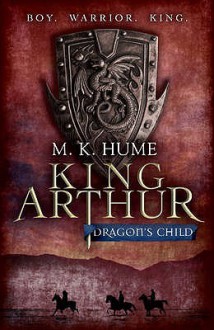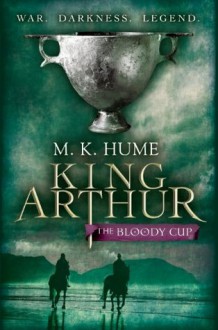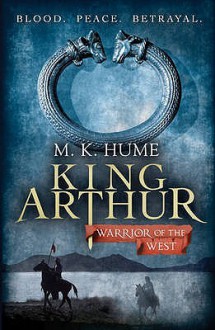
Synopsis
Uther Pendragon, High King of Britain, is dying. As he weakens, Britain is being torn apart by the squabbling of kings. Only one man can bring them together. This is the legend of Artorex, the man destined to be King Arthur. Artorex, tall for his years, is growing up in the household of Lord Ector. Artorex was sent here by the Bishop of Glastonbury when he was but a babe in arms and, although his parentage is unknown, life has been unremarkable. That is, until the arrival of three men who arrange for him to be trained in the skills of the warrior; blade and shield, horse and fire; pain and bravery. By the time the men return, Artorex is both a father and a warrior -- and married to Lady Gallia. The country is in a desperate state -- Londinium is about to fall to the Saxons and Artorex is needed to help fight their advance. But to do so, he must leave his wife and family in the care of others. In an act of appalling treachery, they are slaughtered. But despite his terrible grief, Artorex's destiny is set. He launches into a campaign of battle against the Saxon hordes, earning himself the trust of all men, and proving himself to be the only worthy successor to Uther.But Uther cannot accept Artorex's role and hides his sword and crown. If Artorex is to unite the kings and fulfil his destiny, he needs the weapon destined to be worn by the High King of the Britons. Can he find the embittered Uther's hiding place? The future of Britain is at stake...
Review
If you are obsessed with anything about King Arthur then this book will interest you. Like many authors before, M.K. Hume put her take on a timeless classic. And did you know she has a PhD in Arthurian history.
But unlike the others, this one takes place through Arthur's childhood to adulthood, and how Arthur becomes the man we know so well and what makes him do the things he does.
Dragon's Child is a novel for adult readers, because it contains all kinds of brutality from child mutilation and domestic violence (wife beating) to sexual violence and bloody murders. The scene involving the dark god worship and the altar was a brilliantly brutal and disturbing scene and it may be a shocking reading experience to readers who aren't used to reading dark and disturbing material. Even though reading these types of scenes makes me sick to the stomach, it makes me want to read it to the end, hoping the good guy wins in the end.
I think it's good to mention that in this novel bad things happen to good people. This is not a bad concept, because it shows that the author doesn't shy away from difficult material and isn't afraid of shocking her readers. I've always respected authors who are willing to take risks with their stories and make readers move away from their comfort zones. Let's look at A Song Of Ice And Fire by George R.R. Martin as an example. When you think you have everything worked out, you get slapped in the face with a major plot twist.
M. K. Hume has an interesting way of avoiding typical clichés associated with Arthurian legends and historical fantasy novels. She hasn't made easy choices and writes unflinchingly about brutal scenes, which is very nice. She has taken quite a lot of liberties with the legend of King Arthur, but that's a good thing, because it was nice to read a new retelling of the famous legend. She has made many changes to the story, but these changes are interesting.
I have to admit that I was impressed by how easily the author wrote about the life and the customs of the people at the Villa Poppinidii. She pays attention to small details and makes everything feel realistic and believable. Her descriptions of the people and their lives were interesting. She has plenty of imagination, because she has created a believable vision of Celtic Britain in the Dark Ages (she has had courage to write about what life was really like during the time of King Arthur).
The author's detailed descriptions of the ancient life are so believable that at times it felt like I was reading a history book. This didn't bother me at all, because I'm interested in ancient history, and more importantly you want to read a book that is authentic as possible to that time period.
Let's all be honest here, do you really want to read a historical novel with characters who act like they are from the present? I don't think so.
I think it's also great that the author has used old words and terms in this novel, because it adds a bit of realism to the storyline. I also have to mention that the maps makes me love this book much more. I always appreciate any type of book where there is a map, that way I can see where our main characters are and where they are traveling to.
It's possible that Dragon's Child may split readers to those who like it and to those who don't like it, because it isn't your usual kind of King Arthur story. There's plenty of morality in this novel and the author also shows that the actions of the characters have consequences and it's up to them to either learn about their mistakes or ignore them. I personally enjoyed reading this novel, because it was something a bit different.
I'll soon read and review The Warrior of the West, which is the second novel of The King Arthur Trilogy. It'll be interesting to see how the author continues the story, because this novel laid a good foundation for the sequels.
I recommend Dragon's Child to readers who love Arthurian stories, because it's an interesting reading experience. It's an entertaining piece of historical fiction that tells the legend of King Arthur in a totally different kind of way, because the author concentrates on writing about King Arthur, his life and his feelings. It's not an easy novel, because it contains brutal scenes, but it's interesting entertainment. I think that Dragon's Child will be of interest to readers of historical fiction and epic fantasy, because it contains an epic story arc and vivid descriptions of life in ancient Britain.




 Log in with Facebook
Log in with Facebook 







